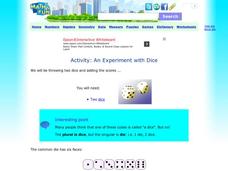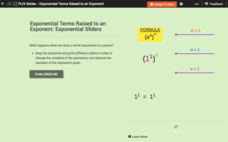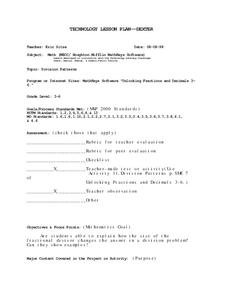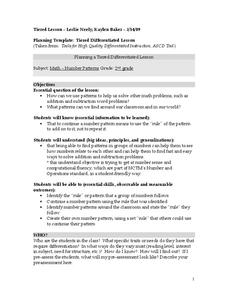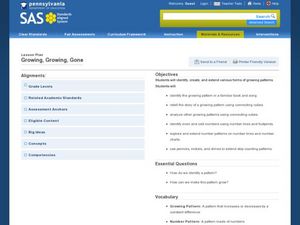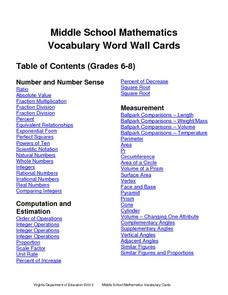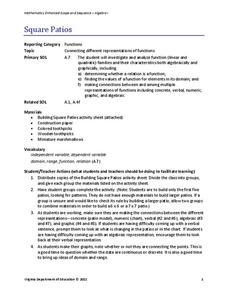Mathematics Vision Project
More Functions, More Features
Learners tackle a wide range of intimidating topics in this comprehensive unit that spans piecewise functions, absolute value of functions, and inverse functions (among other topics). Investigative group work alternates with more...
Curated OER
Activity: An Experiment with Dice
Roll the dice with this activity and teach young mathematicians about probability. Record outcomes for rolling two number cubes in order to determine what is most likely to happen. Graph the data and investigate patterns in the results,...
CK-12 Foundation
Exponential Terms Raised to an Exponent: Exponential Sliders
Discover the pattern of exponents through an interactive lesson. Young mathematicians manipulate sliders and watch the result as they change the base or exponents in an expression. The tutorial shows them the simplified expression and...
Curated OER
Division Patterns
Learners investigate the concept of division and how numbers fit into specific patterns while practicing the skills finding equivalent fractions. They practice solving different division sentences while answering questions asked during...
Curated OER
Relate Counting to Addition and Subtraction
Find 10 simple word problems that require addition and subtraction skills. Although these offer clear math procedure, the grammar isn't perfect. The highest number your learners encounter here is 40, and each question has room for...
Pennsylvania Department of Education
Analyzing Numeric and Geometric Patterns of Paper Pool
Students use concrete and pictorial representation of geometric patterns to extend patterns. In this geometric patterns lesson plan, students identify patterns and extend them.
Curated OER
Patterns in Pascal's Triangle
Students examine the patterns that exist in Pascal's Triangle. They explore multiples and factors. Sudents use an applet to create and color the multiples in Pascal's Triangle.
Curated OER
Measuring Pattern Block Angles
Sixth graders review the rotation of 180 and 360 degrees. Using the alphabet, they estimate the angle degree and identify the angles as either right, straight, obtuse or acute. In groups, they measure the pattern block angles and record...
Curated OER
Number Patterns
Second graders identify number patterns. In this number lesson, 2nd graders find the rule or pattern in a group of numbers and continue the pattern using the rule. They create their own number pattern by making their own rule.
Curated OER
Investigation-Pattern/Functions
Students explore number patterns. In this number patterns and probability math lesson, students work in groups to describe the patterns present in the first five rows of Pascal's Triangle, then write numbers to continue this pattern....
Curated OER
Adire Eleko Cloth Glue Patterns
First graders are introduced to the art form of African Adire Eleko cloth - painted patterned textiles. They use paper, glue and paint to imitate the technique and create similar patterns on paper.
Curated OER
Number Patterns
Fourth graders recognize patterns in a series of numbers and symbols. They also make their own patterns and explain them in writing. After practicing with a worksheet imbedded in this plan, 4th graders attempt to make up their own number...
Curated OER
Calendar Math
Students count and name the numbers and days on the calendar in order to determine the date. They identify the month and the entire date, and determine the pattern shown on the calendar markers. Students then calculate how many days...
Curated OER
Growing, Growing, Gone
Budding mathematicians identify growing patterns in numbers and songs then create their own patterns. They look at number patterns and language patterns and then create their own using money and footprints.
Curated OER
Using Numbers Everywhere
Kindergarteners explore various representations and uses of numbers to develop number sense. They participate in an activity and arrange patterns into groups. Students compare the sets and describe the objects in each set.
Curated OER
Getting It Right!
Students construct right triangles, measuring the sides and recording the measurements in spreadsheets. They analyze their measurements for patterns and research the Internet for information on Pythagoras.
Curated OER
A Fibonacci Primer
Upper graders explore the Fibonacci sequence. They examine the characteristics of the Fibonacci sequence, list the properties of the sequence and determine how it connects to Pythagorean Triples. Related thinking questions are included.
NTTI
Putting Together Ten
Groups explore sets of 10 items in two varieties (i.e. 3 white buttons and 7 black ones, or 5 bears and 5 bunnies). They brainstorm about their objects, write math sentences to represent what they have, and report their discoveries to...
Richland County School District One
Falling Into Geometry Through Paper Art
New-to-school learners create a fall quilt consisting of three different paper geometric quilt squares. They use various geometric shapes that when assembled will form a scarecrow, pumpkin, and a crow. Assembly will require sorting...
Curated OER
Be Sharp and Never Flat
An outstanding lesson on music awaits your young composers! They learn about patterns found in music, the different sections of an orchestra, and see the differences between musicians and a composer. Excellent streamed videos and good...
Curated OER
Hand Span and Height
Is there a relationship between hand span width and height? Statisticians survey each other by taking measurements of both. A table that can hold data for 24 individuals is printed onto the worksheet, along with questions for analysis....
Virginia Department of Education
Middle School Mathematics Vocabulary Word Wall Cards
Having a good working knowledge of math vocabulary is so important for learners as they progress through different levels of mathematical learning. Here is 125 pages worth of wonderfully constructed vocabulary and concept review cards....
Curated OER
Tiling Tessellations
Young scholars explore tessellations. In this shapes and geometry lesson, students describe the attributes of many of the shapes displayed on an Elmo. Young scholars create examples of tessellations using pattern blocks.
Virginia Department of Education
Square Patios
Build a patio from toothpicks and marshmallows to analyze functions! Learners look for patterns in the data as they create different size patios. As they discover patterns, they make connections between the different representations of...



